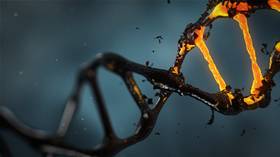‘Increased mortality’: 1st generation CRISPR babies will likely die young, scientists warn

It is now six months since the world’s first gene-edited babies were born in China, but researchers in the US warn that, though the twin girls may be more resistant to HIV, they also have “significantly increased mortality.”
Geneticist He Jiankui, dubbed the 'Chinese Frankenstein,' shocked the world in November 2018 when he announced that he had created the first gene-edited babies. He and his team edited the gene CCR5 from two twin babies (a third gene-edited child is due to be born this summer) in a bid to make them immune from HIV.
Also on rt.com Designer baby steps: World’s first ‘gene-edited’ children born in ChinaHowever, it turns out that people with the variant of that genome that He and his team gave the children are 21 percent more likely to die younger according to researchers from UC Berkeley.
Having searched through a vast repository of human-subject DNA from some 400,000 people, the Berkeley scientists found that CCR5 is somewhat of a double-edged sword: while it might grant the children a heightened immunity to the HIV virus, it leaves them more susceptible to dangerous strains of flu and the West Nile Virus.
“What we found is that they had significantly increased mortality,” lead researcher Rasmus Nielsen told NPR, breaking the unfortunate news that the twin girls are now 21 percent less likely to live until the age of 76 as a result of the CRISPR editing they were subjected to.
The scientific community at large was outraged when reports first appeared of He's human experiments and it appears their indignation has been vindicated.
Also on rt.com Gene-edited Chinese CRISPR babies may have mental ‘superpowers’, researchers warnIn addition, according to the data He himself presented last year following his bombshell announcement, he didn't even manage to edit the specific gene as intended, further emphasizing the risk inherent to playing god with our own DNA.
The changes made could last for generations, further highlighting the dramatic consequences of failure and the extremely tight margins for error.
Think your friends would be interested? Share this story!















